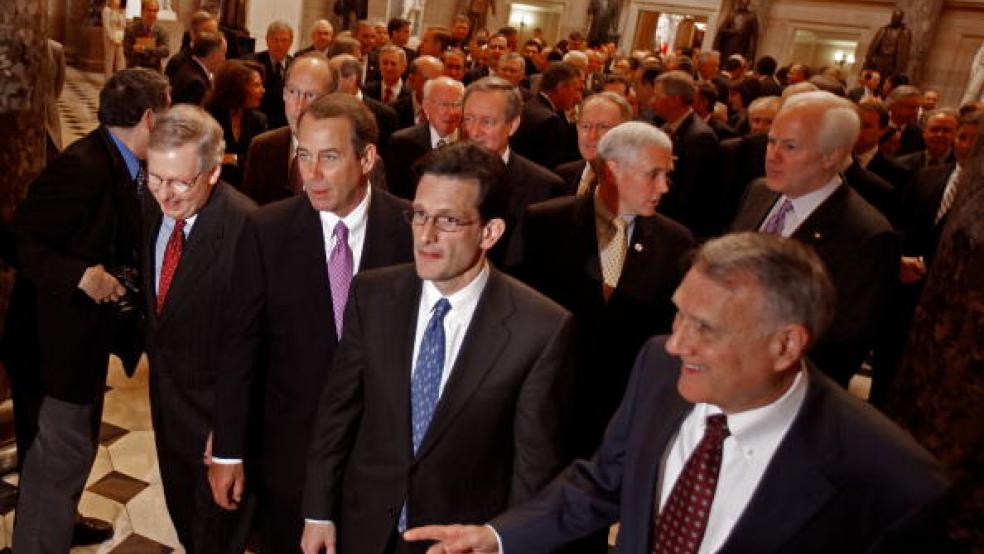What did Republicans get out of the shutdown, debt-ceiling standoff and two-week national freakout?
Nothing, writes Molly Ball at The Atlantic:
“Obamacare will not be repealed. Obamacare will not be defunded. Obamacare will not be delayed. The individual mandate will not be delayed. The medical-device tax will not be repealed. The health-insurance subsidies given to members of Congress and their staffs will not be taken away.
Democrats will get the government funded at levels they (grudgingly) sought in the first place, for longer than they originally sought, and without the looming threat of default.”
It’s difficult even for Republicans to disagree. “We took some bread crumbs and left an entire meal on the table,” Senator Lindsey Graham (R-SC) said, according to The New York Times. “This has been a really bad two weeks for the Republican Party.”
RELATED: SENATE REACHES A DEAL TO AVOID DEFAULT, END SHUTDOWN
The party saw its favorability ratings sink to record lows and sparked speculation about just when it might reach “the political equivalent of rock bottom.” Senator Ted Cruz (R-TX), who pushed for this fight, may have cemented his status as the leader of the Tea Party caucus and its firebrand-in-chief, but he alienated himself from his fellow Republicans, especially in the Senate, and damaged his standing with the types of centrist and independent voters he’ll need if he ever wants to make a legitimate run at the White House and not just the Republican presidential nomination. His hometown newspaper, The Houston Chronicle, had endorsed him in last year’s general election, but lambasted him in an editorial for being “part of the problem” where his predecessor, Kay Bailey Hutchison, would have been working for solutions. His national reputation is much, much worse. He’s become a punchline.
RELATED: CRUZ FINALLY BLINKS AS SENATE DEBT PLAN MOVES FORWARD
Yet some GOPers may have managed some strategic gains. Senator Mitch McConnell (R-KY), facing a re-election contest next year, had seemed content to stay on the sidelines and avoid giving Matt Bevin, his conservative primary challenger, ammunition for attack ads. As the hours ticked away, though, McConnell reemerged as the Senate GOP’s closer. Kentucky voters will get to decide whether that merits another term in office.
And as Josh Boak points out here, for all the criticism that has been pointed at House Speaker John Boehner, he looks to have won himself the trust of the Tea Party caucus, even as he failed on Tuesday to secure enough votes to pass an alternative to the Senate plan. “I’ve been really proud of Speaker Boehner,” Rep. Raul Labrador (R-ID) told a panel of conservative lawmakers Tuesday. The speculation about Boehner losing his leadership position has dissipated, at least for now – meaning he gets to keep trying to herd Congressional cats for a while longer.
If the Republican Party as a whole has seen its approval ratings plummet and its ranks divided, the Pew survey released Tuesday suggests a few surprising glimmers of hope mixed in with the news that the American public sees GOPers as more extreme and less willing to reach across the aisle. By a margin of 44 percent to 37 percent, Americans say the Republicans are better able to steer the economy. A similar number say they can better manage the federal government.
If the recent brinksmanship hasn’t crushed the public perception of the party on those issues, that may at least form a base of support in coming fiscal fights.
And those fights are coming, as Graham noted in offering a sort of silver lining. “This package is a joke compared to what we could have gotten if we had a more reasonable approach,” he said. “But live and learn; we’ll be doing this again in a couple months.”






